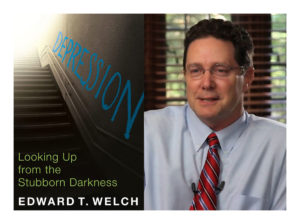
As one with engineering background, I have such an innate tendency to problem solve. And this plays out when I seek to care for the depressed around me: ‘Now, let’s see what is the root cause. It’s trouble-shooting time!’ And it doesn’t help that many who are depressed are also hoping and struggling to find answers to their questions: ‘Why am I feeling like this? Why me? What happened?’
So it is very helpful that in the opening chapters, Welch cautioned friends and family not to rush in, ‘armed with THE answer’. He began by helping readers grasp the multi-faceted nature for the causes of depression. Having said that, Welch also goes on to talk about depression ‘not appearing out of nowhere but it has its reason’. He encourages listening and following the markers to discover one’s internal beliefs and ultimately one’s heart and spiritual allegiances. This is in fact the premise for the entire Part 2, where he dealt with fear, anger, guilt, shame, jealousy, wants, despair over loss, physical weaknesses etc.
Personally, in thinking about depression, I used to struggle with: ‘So is depression caused by a root sin or not? Yes or no?’ My counselling approach used to be binary. This book echoes and reinforces the lessons I have learnt over the years through mistakes I made in caring for the depressed. I resonate with Welch’s call to appreciate the complexity and darkness of our broken world. And don’t over-simplify (especially!) pain and suffering. And to slow down to explore the heart while recognising that the process itself is opportunity to grow in reliance upon God. His grace comes not only at the end when the root is finally uncovered, but all along the ‘pilgrim journey’. We don’t have to know the exact cause of suffering to find hope and comfort: ‘Scripture doesn’t give knowledge so that we will have intellectual mastery of certain events. It gives us knowledge so that we would know and trust God. Whom will I trust? Whom will I worship?’
Welch’s book is a must read for everyone who cares about those who are depressed, and desires to love them well. It is certainly not a short read. But it is comprehensive and very pastoral. It ranks on my list as THE NUMBER 1 TEXT BOOK for a biblical approach to depression. Welch has helped me see that I can love and minister to depression sufferers without knowing the source of suffering. Having grown up in movements like TGC and T4G, I have caught on and used catchphrases like ‘The gospel is not just the ABC but the AtoZ of the Christian life’ or ‘We don’t just begin but continue and end in the gospel’. Seeing Welch applying and speaking the gospel concretely into the lives of those who are depressed makes these catchphrases come alive to me. Indeed, we continue with the gospel every day, in our fallen but redeemed state, all the way until Jesus returns!
